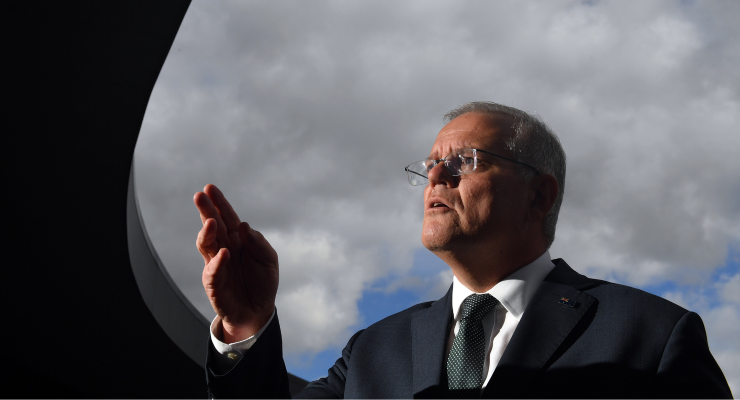
Peter Dutton has called the reaction to Scott Morrison’s secret ministries “hysterical”, and he’s not alone. While former senator Amanda Vanstone thinks Morrison’s moves don’t pass the pub test, and some of ScoMo’s secretly shadowed ministers have made their indignation plain, ex-PM John Howard disagreed, claiming the issue was not so “reeking in principle” as to warrant any action that would harm the Liberal Party. Former Nationals’ leader Barnaby Joyce dismissed the scandal as “hyperventilation” by the political classes given “there was nothing illegal done”.
In fact, there may have been illegal things done. Look no further than former Liberal leader and top silk Malcolm Turnbull’s musings on Twitter about whether exercise of statutory ministerial powers is lawful if their exercise is conducted in secret.
But even if the only thing shattered in the Many Ministerial Faces of Morrison affair are democratic “principles,” “norms” or “values”, that is enough. Enough to show something terrible happened that needs to be identified and redressed.
Why? Because the ethical piece of governance isn’t like a serviette at dinner — nice to have but non-essential to the main work of eating the meal. Instead, moral principles like transparency, accountability, fairness, the priority of public over personal interest — I could go on — are essential touchstones for leaders who regularly face unique governance dilemmas about which the law will have nothing to say.
Such leaders will always need to negotiate conflicts between equities and rights. To do this, they’ll need a quiver full of ethical processes like accountability and transparency, as well as values like privileging the public over party and self. They’ll require self-knowledge and wisdom to know what the right decision is, and the courage to follow through.
The solicitor-general’s opinion is an important word on the affair, and luckily the prime minister says it won’t be the last one. But we don’t need a strictly legal inquiry. We need a royal commission with broad terms of reference to make sure there is full transparency about what happened and why — in moral as well as legal, social and political terms.
A royal commission would thrive in such a teachable moment. Democratic backsliding in advanced democracies is rife, and Australia is no exception. This is our chance to respond to an early warning sign of our own system’s vulnerability before the problem gets worse.
A royal commission will also ensure we gain insight into every nuance of the former PM’s secretive power play. Where was the public service? What about the moral — not legal — obligations of the governor-general and the colleagues of Morrison who knew what was happening? Why didn’t anyone raise objections or at the very least put the Australian public in the know by leaking or speaking out?
This is what Australians need to know: where the guardians of our democracy faltered — in wisdom or courage or both — so we can provide the training and support they need to make sure such democratic overreach doesn’t happen again.
Has Morrison’s secret ministry business harmed Australia’s democratic system? Let us know your thoughts by writing to letters@crikey.com.au. Please include your full name to be considered for publication. We reserve the right to edit for length and clarity.








Lift that man-hole cover and who knows what you’ll find in the sewers below…. well some people know, that’s why they don’t want it lifted…..
We need to find out why secrecy hid the legal activity, but NOT a Royal commission. This involves two people, it should not cost us millions or billions of dollars to find out what happened and why. It proved what we already know and was repeated by one of the two, “you cannot trust governments”
Agree. Surely a quick inquiry is all that is required. If more news is unearthed from that inquiry, then perhaps look further again from there.
Not happy for this to be swept under the carpet. I agree it needs a blow by blow forensic investigation.
Thanks Leslie. A very good outline of the range of matters that ought to be the remit of a Commonwealth integrity commission. Just society relies on a lot more than the law. And your point about preferring society’s interests above your own and party is a reminder that government is inherently fiduciary. A really good short exposition of the distinct but overlapping regimes of law, ethics, morality and community obligation. For beginners, read John Irving’s ‘The Cider House Rules’, the most poetic examination of the essence of humanity.
Morrison’s behaviour and the reasons for it may only be revealed by future events.He has always been ‘a man with a plan’ so we should be looking ‘forward’ as well as ‘backwards’ to try and detect his motives.